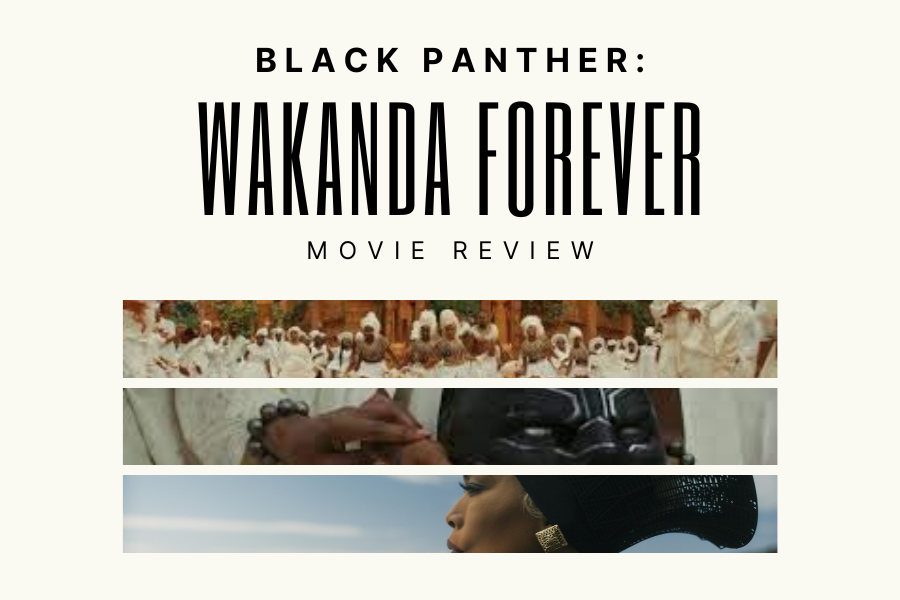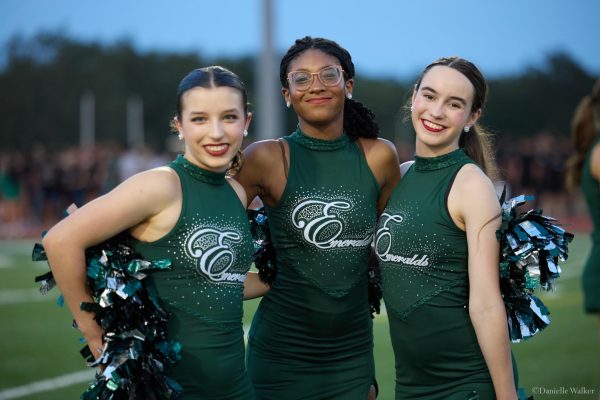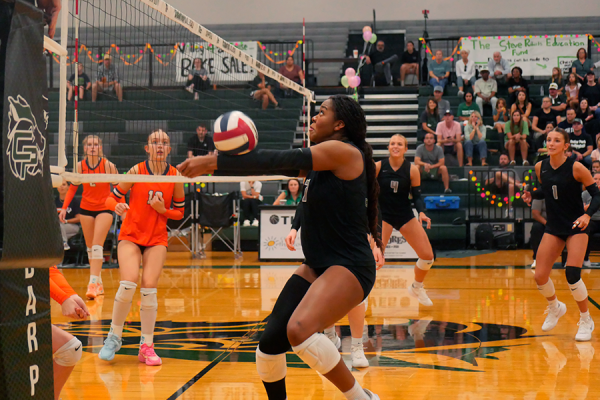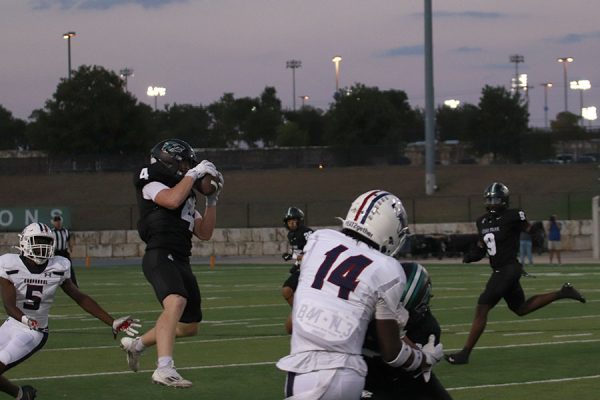Wakanda Forever
A Marvel Film Tackling Grief, Humanity
“Black Panther: Wakanda Forever” is a Marvel film directed by Ryan Coogler released on Nov. 11. The movie did a phenomenal job adding in themes of grief and retribution, however it was definitely not perfect. With its complex subject and turbulent pacing, it was a bit difficult to watch all the way through. However, the characters, costumes and special effects were to die for. Overall, the movie was not perfect, but I would definitely watch again. (Movie stills courtesy of Marvel Studios)
December 14, 2022
“Black Panther: Wakanda Forever” tackles a difficult topic: how grief can change a person. After the death of Chadwick Boseman, the actor that played Black Panther in the first movie, it was clear that Marvel had to entirely change gears.
The film’s dealing with grief hits the audience almost immediately. It’s a clear tribute to Boseman, as the beginning credit scene that usually fills up with scenes from the Marvel movies was filled with pictures and videos of the late actor.
The movie opens with the death of King T’Challa, and the women of the movie, Queen Ramonda, Princess Shuri, Nakia and Okoye, mourn the death of their king, son, brother and friend.
It’s already pretty difficult not to tear up, however, the movie quickly dries up those tears and picks up on its conflict. One year later, after King T’Challa’s death, vibranium is located in the ocean, and as various parties try to steal it by force, they are attacked by blue water breathing people.
The main conflict is between these water breathing people, their ruler, Namor, and the Wakandans. Namor wishes to create an alliance with Wakanda about the distribution of vibranium, but Wakanda refuses, and this creates the climax. Now, I won’t spoil the rest of the movie, so if you’d like to find out about the end, you can check out the rest of the movie.
The definite main character of the film is Shuri, T’Challa’s little genius sister, and the film follows her journey through the several stages of grief filling in her brother’s shoes. We see her grow through each stage: denial, desperation, anger, depression/anxiety, confusion, re-evaluation and acceptance. Each of these emotions could be pinpointed through a scene in the movie, and this was something I enjoyed picking out.
In many ways, the movie felt incredibly relatable through the emotional lens. Many of us can relate to friends or relatives passing away and facing our grief after that. Having a massive film studio, like Marvel, create a movie tackling those difficult emotions felt incredibly validating, and that is something I greatly appreciated while reflecting on the movie.
“Wakanda Forever” is like many Marvel movies, it has great characters and story ideas, but too much plot and too many characters. Now, don’t get me wrong — I’m a Marvel fan through and through, but I can recognize the movies’ faults as well. This movie felt way too compact. In two hours and forty one minutes, all I remember is Shuri grieving her brother, and the ending, which I won’t spoil. All of those different fight scenes featuring the Wakandans, the political drama with Shuri and the Queen filling in T’Challa’s footsteps, and a whole bunch of other plotlines, I lost track.
Another thing I did enjoy, however, was the fact that the feminist ideals of only women running Wakanda were not forced or spoon-fed into the mouths of the viewers. There are movies which force feminism, and they’re usually pretty difficult to enjoy because of that, but “Wakanda Forever” did a great job of incorporating that female inclusion in a proper, natural and well-fitted pace and storyline. There was a perfect steadiness of Shuri building on the success of her brother, the Queen filling in as leader, and the Dora Milaje (the all-female elite group of warriors) dealing with their own emotions. None of these plot points overshadowed or overtook the male characters, which created a perfect balance.
What made the first Black Panther so special? When I thought of this question, my number one response was the fact that the authentic black voices, culture, and society used to create the movie molded it in such a way that it represented not only African-Americans, but also everyone else who watched the first movie. It created a deeper awareness of the race problem in the movie industry, and caused people to reflect on their own lives and biases, something which made the first movie, I believe, monumental.
I believe that “Wakanda Forever” erased most of that authenticity, that voice. I understand that its focus was grief and the human condition, but with it being a sequel of such a transcendent first film, I was expecting a continued version of that authenticity. Of course, the gorgeous costumes, hair, makeup, and many different languages incorporated tried to represent that streak, but I believe it was overshadowed by adding an entirely different culture, Hispanic culture, into the mix.
To me, it feels as though Hispanic culture was just thrown into the movie, and this mashed together the true influence that having an only-black culture, like Black Panther one, or only-Hispanic cultured film could’ve done. I would love to see an all-hispanic Marvel movie featuring characters and mythologies from the Aztec or Mayan peoples, but I feel as if they threw away that chance by mixing the culture into the movie. Having another entirely separate culture be mixed in and made the enemy through Wakanda Forever gave me the wrong impression about what demographic the movie was trying to represent.
Nevertheless, the movie is definitely impactful. I cannot say whether it was a bad or good movie, but there were parts that I definitely enjoyed and some which I didn’t really enjoy.
Considering all of my thoughts about the movie, I rate it a 6/10.



![Jumping off the ground, senior linebacker Bennett Patton snatches the ball out of the air for an interception at Thursday’s game against Chaparral. Patton had two interceptions in the 56-14 victory, tying the school record for interceptions in a game. “I was just playing the game,” Patton said. “[I’m] going to go into next week, forget about it and stay humble.” Photo by Harper Chapman](https://cphswolfpack.com/wp-content/uploads/2025/09/bennett-interception.jpg)
![The fire department came to the school after students were evacuated when smoke started coming from the ceiling of a classroom. All students and staff are safe. “All of my friends left their stuff too, so we couldn’t contact our parents, and it was stressful,” senior Brynn Fowler said. “It was scary because I didn’t know [what was going on], and I couldn’t find anyone because it was a big crowd.” Photo by Anthony Garcia](https://cphswolfpack.com/wp-content/uploads/2025/09/firetruck.jpg)


![Sitting with her friend senior Sohpia Struve at last year’s Austin City Limits Festival, senior Ava Zuniga poses for a picture under a pavilion. They are frequent attendees at ACL, an annual music festival at Zilker Park. “I would recommend seeing a bunch of people,” Zuniga said. “This past year, we camped out for Chappell [Roan] for a really long time. I think the whole point of ACL, [which] is a lot of fun, is that you can go see so many different people, even if you don’t know them. So by camping by one person, it really limits yourself from being able to go see a bunch of people.” Photo courtesy of Ava Zuniga](https://cphswolfpack.com/wp-content/uploads/2025/10/EE9E9484-FE6F-4AA0-B5F5-0C177AB32841-1200x857.jpeg)
![Broadcast, yearbook and newspaper combined for 66 Interscholastic League Press Conference awards this year. Yearbook won 43, newspaper won 14 and broadcast took home nine. “I think [the ILPC awards] are a great way to give the kids some acknowledgement for all of their hard work,” newspaper and yearbook adviser Paige Hert said. “They typically spend the year covering everyone else’s big moments, so it’s really cool for them to be celebrated so many times and in so many different ways.”](https://cphswolfpack.com/wp-content/uploads/2025/05/edited-ILPC.jpg)





![Looking down at his racket, junior Hasun Nguyen hits the green tennis ball. Hasun has played tennis since he was 9 years old, and he is on the varsity team. "I feel like it’s not really appreciated in America as much, but [tennis] is a really competitive and mentally challenging sport,” Nguyen said. “I’m really level-headed and can keep my cool during a match, and that helps me play a bit better under pressure.” Photo by Kyra Cox](https://cphswolfpack.com/wp-content/uploads/2025/09/hasun.jpg)

![Bringing her arm over her head and taking a quick breath, junior Lauren Lucas swims the final laps of the 500 freestyle at the regionals swimming competition on date. Lucas broke the school’s 18-year-old record for the 500 freestyle at regionals and again at state with a time of 4:58.63. “I’d had my eye on that 500 record since my freshman year, so I was really excited to see if I could get it at regionals or districts,” Lucas said. “ State is always a really fun experience and medaling for the first time was really great. It was a very very tight race, [so] I was a bit surprised [that I medaled]. [There were] a lot of fast girls at the meet in general, [and] it was like a dogfight back and forth, back and forth.” Photo by Kaydence Wilkinson](https://cphswolfpack.com/wp-content/uploads/2025/03/Kaydence-2.7-23-edit-2.jpg)
![As the support team sits and poses for a photo in the cafeteria with the counseling team they eagerly wait to start their day. "We [all] seem to be a team, I get up every day and there's days where I don't want to go to work today, but I'm thankful that I have a job and I'm blessed to have what I have," Christopherson said. Photo Courtesy of Julie Weltens.](https://cphswolfpack.com/wp-content/uploads/2025/01/AF9E8470-10D7-4C91-BF28-EC8F86BAB66C-1200x852.jpeg)
![As he sprints with the ball, senior running back Trae Hill breaks a tackle during Friday’s 35-14 loss against the Vandegrift Vipers. Hill ran for 135 yards and two touchdowns during the game. “[Scoring] was electric,” Hill said. “It always feels good to score, but the O-line did everything.”](https://cphswolfpack.com/wp-content/uploads/2025/09/IMG_0795allie.varfb_-1200x799.jpg)

























![The fire department came to the school after students were evacuated when smoke started coming from the ceiling of a classroom. All students and staff are safe. “All of my friends left their stuff too, so we couldn’t contact our parents, and it was stressful,” senior Brynn Fowler said. “It was scary because I didn’t know [what was going on], and I couldn’t find anyone because it was a big crowd.” Photo by Anthony Garcia](https://cphswolfpack.com/wp-content/uploads/2025/09/firetruck-300x200.jpg)

![Finishing her night out after attending a local concert, senior Grace Sauers smiles at the camera. She recently started a business, PrettySick, that takes photos as well as sells merch at local concert venues. Next year, she will attend Columbia Chicago College majoring in Graphic Design. “There's such a good communal scene because there [are] great venues in Austin,” Sauers said. “I'm gonna miss it in Austin, but I do know Chicago is good, it's not like I'm going to the middle of nowhere. I just have to find my footing again.” Photo Courtesy of Grace Sauers.](https://cphswolfpack.com/wp-content/uploads/2025/04/Grace-300x225.png)


